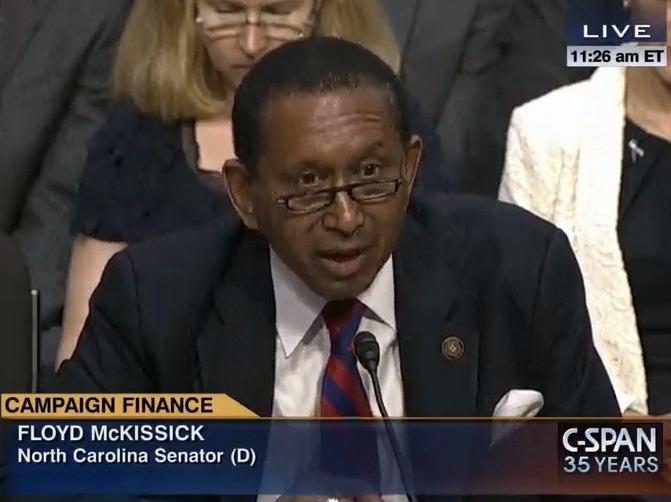Art Pope, NC featured in national debate on campaign finance reform

This week in Washington, Democrats on the Senate Judiciary committee led a hearing about the corrupting influence of money in politics, including debate over a proposed constitutional amendment that -- in defiance of recent Supreme Court decisions -- would give Congress and states more power to regulate election spending.
Exhibit A in the Democrats' case for reform: North Carolina and the role of multimillionaire donor Art Pope, whose generous political spending has fueled a sharp political shift in the state.
North Carolina state Sen. Floyd McKissick, a Durham Democrat, kicked off testimony on the amendment, introduced by Democratic Sen. Tom Udall of New Mexico. While noting that "donors with deep pockets had too much influence" before the Supreme Court's Citizens United ruling in 2010, McKissick argued in his testimony [pdf] that it marked a turn in Big Money's influence in the state:
Suddenly, no matter what the race was, money came flooding in. Even elected officials who had been in office for decades told me they'd never seen anything like it. We were barraged by television ads that were uglier and less honest than I would have thought possible. And they all seemed to be coming from groups with names we had never even heard of. But it was clear that corporations and individuals who could write giant checks had a new level of power in the state.
Sometimes, we knew where the money was coming from. Sometimes we didn't. But I've lived long enough to know the billionaires and big corporations who opened their wallets wanted something in return.
A video of McKissick's full testimony is available at C-SPAN (beginning at 54:40).
McKissick went on to note the unique role of Art Pope's political network in the rise of spending by outside groups in state politics. As Facing South and others have documented, three groups backed by Pope -- Americans for Prosperity, Civitas Action and Real Jobs NC -- spent just under $2 million targeting state legislative elections in 2010, or 75 percent of the outside money flooding into North Carolina House and Senate races.
As documented by the Facing South/Institute for Southern Studies website FollowNCMoney.org, in 2012 those same three groups spent just over $1.4 million in state races. Pope's company Variety Wholesalers also donated to two Washington, DC-based super PACs, the Republican Governors Association and Republican State Leadership Committee, which in turn directly and indirectly funneled more than $6 million into North Carolina races, most notably to benefit the successful gubernatorial bid of Republican Pat McCrory, who then appointed Pope to serve as his budget director.
Pope, said McKissick, "could afford to spend lavishly, and he certainly got his money's worth."
In an interview with The News & Observer of Raleigh, Pope stated that "Sen. McKissick was badly misinformed, and repeated false statements about the state of North Carolina being bought in the 2010 elections." He said that Democrats had outpsent Republicans for "a hundred years" in North Carolina. The paper reported that "Pope also said North Carolina voters are intelligent enough to vote as they please, without help from big company spending."
Republicans in Washington were similarly scornful about the hearing and the Udall amendment. A Constitutional amendment requires two-thirds of the vote in both chambers of Congress and support from three-quarters of state legislatures. Given these long odds, Senate Minority Leader Mitch McConnell (R-KY) denounced the hearing as political theater. Tea Party favorite Sen. Ted Cruz of Florida went to a further extreme, claiming the amendment "would give Congress the power to ban books and to ban movies," although he didn't elaborate why.
Sen. Harry Reid (D-NV), who has denounced Americans for Prosperity from the Senate floor, argued that, whatever the likelihood of passage, debate over the amendment was essential given the escalating role of Big Money in the political system:
The flood of dark money into our nation's political system poses the greatest threat to our democracy that I have witnessed during my time in public service ... We can keep the status quo and argue all day and all night -- forever -- about whose billionaires are right and whose billionaires are wrong. Or, we can work together to change the system, to get this shady money out of our democracy and restore the basic principle of one American, one vote.
Tags
Chris Kromm
Chris Kromm is executive director of the Institute for Southern Studies and publisher of the Institute's online magazine, Facing South.
